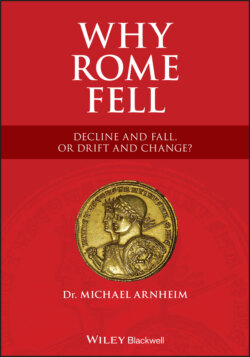Читать книгу Why Rome Fell - Michael Arnheim - Страница 7
Preface
ОглавлениеThis book has had a very long gestation period. Having developed an interest as an undergraduate in elite theory, I decided to test its applicability to the Later Roman Empire for my Cambridge Ph.D., on which I embarked in 1966. My doctoral supervisor, A.H.M. (“Hugo”) Jones, the Cambridge Professor of Ancient History, had brought out his magisterial three-volume Later Roman Empire two years earlier. In my Ph.D. dissertation I emphasized Constantine’s radical departure from his immediate predecessors’ policy by reopening imperial appointments to members of the senatorial aristocracy in the West, from which they had been all but excluded. I concluded that this policy, perpetuated by Constantine’s successors, effectively weakened the imperial government in the West—but not in the East—thus contributing to the fall of the western empire, and paving the way toward the medieval world.
My doctoral oral examination in 1969 turned out to be a surprisingly enjoyable occasion. My examiners, both Oxford men, were Peter Brown, then a Fellow of All Souls, and Professor W.H.C. (“Bill”) Frend of Glasgow University. After a wide-ranging discussion, even including the Chinese mandarinate, both examiners suggested that my dissertation be published as a book, with specific mention of the Oxford University Press. Sure enough, in 1972, a revised version of my thesis duly appeared, under the Clarendon Press imprint, titled The Senatorial Aristocracy in the Later Roman Empire.
In 1971, while my book was in the press, Peter Brown, whose only previous book was a biography of Augustine of Hippo, brought out a slender, lavishly illustrated volume, with very few references, titled The World of Late Antiquity, spanning the period 150–750 CE, from the heyday of the “High Empire” until the end of the early Muslim conquests. Like myself, Brown emphasized continuity well beyond the “fall” of the western empire. But there the similarity ended.
To my surprise, Brown and his followers tend to view the period through rose-colored spectacles, labeling it all, and not least, Christianity—which became dominant in the fourth century—a “Good Thing.” This overtly subjective and judgmental approach, from which most serious historians had been trying to free themselves for the past hundred years or more, inevitably led to special pleading and a distorted view of the period and of history generally.
After testing out my hypothesis about power structure and ethos in a number of different historical periods and societies in my Aristocracy in Greek Society (1977) and Two Models of Government (2016), interspersed with books on religion and law, I eventually decided to return to my original stamping ground.
The present work is a very different book from my 1972 publication, but the conclusions are not essentially different, though they are applied to a much wider canvas. The book’s broad scope has also resulted in a certain amount of overlap between the chapters, giving the book something of a modular character. This feature is also designed to prevent misunderstanding, which is all too common in a subject as controversial as this.
The people whose help and assistance I have received over the years are too numerous to name. But I cannot omit to mention my former student and long-time friend Tom Malnati of Florida, to whom I owe a debt of gratitude for proofreading the whole book. All errors remaining are my own responsibility alone. The encouragement of my friend Jack Ward has probably brought the work to fruition sooner than would otherwise have been the case. And there have been many profitable discussions with colleagues and former students over the years.
I am privileged to have had the late Professor A.H.M. (“Hugo”) Jones as my doctoral supervisor in Cambridge, behind whose slight frame and shy and retiring manner there lurked a powerhouse of erudition and intellectual brilliance. In the best tradition of academic history and scholarly research, his magisterial three-volume Later Roman Empire betrays no clue as to his political or religious beliefs. I also owe a great debt to my mentor, friend and colleague at St. John’s, the late Professor John Crook, a gifted teacher and true polymath, combining an easy familiarity with Classical literature with a depth of knowledge of Ancient History and Roman Law, together with a linguistic facility in ancient and modern languages alike, not to mention skill as a classical clarinettist.
I am delighted to say that I have had a long and happy association with Wiley, starting with my US Constitution for Dummies, the first edition of which came out in 2009, and the second in 2018. I owe a debt of gratitude to the Wiley team with whom I have been working on this book: my managing editor, Andrew Minton, together with Todd Green, Skyler Van Valkenburgh, and latterly Will Croft as executive editor, and Ananth Ganesan. And thanks to the Oxford University Press for allowing me to quote from my Senatorial Aristocracy in the Later Roman Empire, published in 1972.
Any reader of this book is welcome to contact me with queries or comments at: Counsel@arnheim-law.com.
Dr. Michael Arnheim
Summer solstice, 2021
